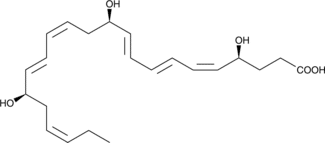Territorial Availability: Available through Bertin Technologies only in France
- Synonyms
- (4S,5Z,7E,9E,11R,13Z,15E,17R,19Z)-4,11,17-trihydroxy-5,7,9,13,15,19-docosahexaenoic acid
- Correlated keywords
- 17-epi 17epi 17R D-3 RvD 17(R)RvD3 17RRvD3 COX2 17(R)HDHA 17RHDHA IL6 IL10 GPR-32 H-460 phago-cytosis over-expressing macro-phages polymorpho-nuclear
- Product Overview:
17(R)-Resolvin D3 (17(R)-RvD3) is an aspirin-triggered epimer of resolvin D3 (Item No. 13834).{25262} It is produced from docosahexaenoic acid (DHA; Item No. 90310) by COX-2 in the presence of aspirin via a 17(R)-hydroperoxy DHA (17(R)-HDHA; Item No. 10005099) intermediate and has been found in mouse inflammatory exudates.{25262,45355} 17(R)-RvD3 reduces transmigration of isolated human polymorphonuclear cells (PMNs) and induces efferocytosis of apoptotic PMNs by macrophages.{45355} 17(R)-RvD3 (10 ng/animal) reduces transmigration of neutrophils into the peritoneal cavity, as well as decreases the levels of IL-6 and increases the levels of IL-10 in inflammatory exudate in a mouse model of zymosan-induced peritonitis. It activates GPR32 in a ?-arrestin reporter assay and increases phagocytosis to a greater degree in CHO cells overexpressing GPR32 compared to mock-transfected cells. 17(R)-RvD3 increases phagocytosis of etoposide-generated tumor cell debris by monocyte-derived macrophages in H460 human lung carcinoma cells in a concentration-dependent manner.{45356} It also inhibits tumor growth in a mouse model of Lewis lung carcinoma when administered at a dose of 0.6 µg/kg per day.
Cayman Chemical’s mission is to help make research possible by supplying scientists worldwide with the basic research tools necessary for advancing human and animal health. Our utmost commitment to healthcare researchers is to offer the highest quality products with an affordable pricing policy.
Our scientists are experts in the synthesis, purification, and characterization of biochemicals ranging from small drug-like heterocycles to complex biolipids, fatty acids, and many others. We are also highly skilled in all aspects of assay and antibody development, protein expression, crystallization, and structure determination.
Over the past thirty years, Cayman developed a deep knowledge base in lipid biochemistry, including research involving the arachidonic acid cascade, inositol phosphates, and cannabinoids. This knowledge enabled the production of reagents of exceptional quality for cancer, oxidative injury, epigenetics, neuroscience, inflammation, metabolism, and many additional lines of research.
Our organic and analytical chemists specialize in the rapid development of manufacturing processes and analytical methods to carry out clinical and commercial GMP-API production. Pre-clinical drug discovery efforts are currently underway in the areas of bone restoration and repair, muscular dystrophy, oncology, and inflammation. A separate group of Ph.D.-level scientists are dedicated to offering Hit-to-Lead Discovery and Profiling Services for epigenetic targets. Our knowledgeable chemists can be contracted to perform complete sample analysis for analytes measured by the majority of our assays. We also offer a wide range of analytical services using LC-MS/MS, HPLC, GC, and many other techniques.
Accreditations
ISO/IEC 17025:2005
ISO Guide 34:2009
Cayman is a leader in the field of emerging drugs of abuse, providing high-purity Schedule I-V Controlled Substances to federally-licensed laboratories and qualified academic research institutions for forensic analyses. We are certified by ACLASS Accreditation Services with dual accreditation to ISO/IEC 17025:2005 and ISO Guide 34:2009.





